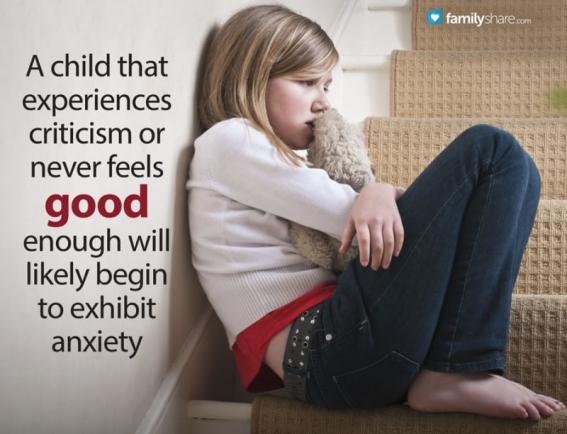
Anxiety is one of the most commonly experienced mental health problems a child faces. For many reasons, they can become worried, scared, and nervous about the world around them and their role in it. This, in turn, results in a feeling of anxiety and insecurity, and if not addressed early can lead to even further anxiety issues and concerns in adulthood. Explained below are 3 ways you may be contributing to this problem:
1. Not enough structure
. A child that has a pre-disposition for anxiety will find situations or home environments without structure as overwhelming and a trigger for anxiety. It is important for these children to have some type of routine on which they can depend each day. This consistency helps eliminate the unsettled or anxious feeling they experience. To combat this, it is important to create household or family rules, general guidelines for schedules, and acceptable behaviors and actions. If a child knows their boundaries, even if they attempt to break them, they will feel more secure in their home environment and in turn have less anxiety.
2. Criticism
. A child that experiences criticism or never feels good enough will likely begin to exhibit anxiety. Children who are constantly looking for approval they do not receive will continue to feel insecure throughout their childhood and into adulthood. They tend to become dependent on others to make decisions, to build them up, or to care for them on a daily basis. For a child with anxiety, even the smallest of criticisms can become a beacon they look to and can never measure up. To combat this, parents need to be aware of their child's concerns and areas of insecurity so as to build them up instead of knocking them down. It is important that parents become extremely aware of a child's emotional needs and meet them.
3. Stressors
While we all have normal stressors in daily life, major events or stressors can cause extreme anxiety reactions in children. Some of these stressors include beginning or changing schools, moving, parents divorcing, or financial problems in the home. The family environment and concerns may not seem apparent to your children, but the emotional stress felt by others can be felt by the children. The way a child deals with change within their own family can differ greatly. For those with anxiety issues, even small changes can send them reeling.
While a child will grow up facing many of these issues at one time or another, it is important to understand that, as parents you can help reduce the overwhelming sense of anxiety that your child might feel simply by creating some accepted family norms, by focusing on the positives, and by teaching your children coping techniques for those unexpected stressors that come along. Taking the time to talk through and work through concerns together will allow your children to become independent adults who have the skills necessary to make choices, learn from setbacks, and effectively deal with stressors as they come along.

